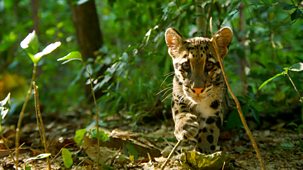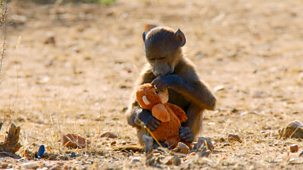
Series 1: 1. The Power of Play
Across the natural world, young animals spend much of their time playing. From cats that love a game of chase to chimps that can solve puzzles, new research now reveals that play is at the heart of almost everything an animal learns. And some unexpected species are getting in on all the fun and games. \n\nIn the jungles of Thailand, clouded leopard cubs are chasing, climbing, jumping on each other and play fighting. And they play these same games over and over again. But why? It is all about the release of dopamine and endorphins – the body’s reward chemicals. They give the animals a feel-good factor, which makes these games highly addictive. And that repetition is vital. The more they play, the more they hone their skills and eventually these cubs will become formidable tree-based hunters. \n\nBut play isn’t practiced by just a few species. Scientist are discovering that it is a lot more widespread than previously thought. Even some reptiles have an appetite for fun. The komodo dragon is the largest lizard on earth and a cold-blooded killer to boot. Professor Gordon Burghardt has been studying them in captivity for the last 20 years and has started to see their playful side. Using objects like paper bags and buckets, he has observed that they like playing with things on their heads and it led him to wonder what they might gain from doing this. He thinks it might replicate their feeding behaviour – burying their heads deep inside a carcass to get food. It is one of the first examples of play behaviour ever recorded in a reptile. \n\nKomodo dragons aren’t the only unexpected animals that love playtime. From juggling otters to sledging crows, scientists are discovering that play is a serious pastime across the natural world and some animals are willing to risk their lives to do it. \n\nIn the forests of Thailand, Gibbons hurl themselves huge distances through the canopy. It is a daredevil method of locomotion called brachiating. But 15 metres up, one slip could prove fatal and it is something that the gibbons have to be prepared for. So, to really get to grips with their treetop world juveniles take an enormous risk. It is thought they allow themselves to fall by momentarily letting go of the branches. It is a risky tactic but one that teaches them how to react if they fall for real. \n\nIt isn’t just how animals play that matters, it is what they play with that could prove critical to their survival in the wild. Young carnivores are among the most playful animals on the planet and science suggests there’s a good reason for that. Their lives depend on their ability to hunt and they like to practice on objects. Marlice Van Vuuren has been looking after orphaned cheetahs for over 30 years and she uses object play to train them for their return to the wild. A game of ball is perfect for helping them learn how to chase down objects that move in unpredictable ways. They also need to make split-second decisions about when to pursue prey and when to call it quits. To sharpen their decision-making skills, Marlice uses an industrial sized game of cat and mouse otherwise known as a lure. It gives her cheetah a mental work out as well as a physical one – helping them assess when they are likely to catch prey. \n\nSo, for predators, play is a mental work out as well as a physical one. And in some species, it doesn’t just give the brain a work out, it could cause parts of the brain to grow. \n\nThe African elephant has one of the longest and most playful childhoods in the animal kingdom. For the first eight years of its life, a calf will rarely stray from its mother's side and with food on tap, they have plenty and time and energy for playing. Scientists now think it helps elephant develop complex social skills, making them one of the most intelligent mammals in the animal kingdom. \n\nThe power of play isn’t just for the young. Macaques in the mountains above Kyoto in Japan play one very unusual game in to their old age. It is called “stone handling”. Some of these remarkable primates roll their stones, others grind their stones and some simply hoard them. Professor Michael Huffman was the first to record such behaviour in this particular troop. He thinks that for the young macaques it’s all about developing critical motor skills. But for the older macaques, stone handling helps prevent the onset of forgetfulness and the loss of mental agility. It is possible that playing with stones is actually slowing down the ageing process. It might explain why these particular macaques have a longer life expectancy. \n\nPerhaps the ultimate example of play with objects can be found in one of the most intelligent animals on earth – the chimpanzee. Studies have shown that they play in much the same way as humans and are able to solve complex puzzle using tools. \n\nPlay is so much more than just fun and games. It is fundamental to an animal’s development and in some cases its survival and we are only just beginning to understand its astonishing powers.
Source: BBC 2
Most recent episodes of Animals at Play
Animals At Play
Series 1: 2. Playing Together
Around the planet, animals play all sorts of group games, from dolphins that play catch to hyena games of tug of war. Scientists are now discovering that playing together can pr ...
16-06-2023
BBC 2
Animals At Play
Series 1: 1. The Power Of Play
Across the natural world, young animals spend much of their time playing. From cats that love a game of chase to chimps that can solve puzzles, new research now reveals that pla ...
15-06-2023
BBC 2
Most popular episodes of Animals at Play
Animals At Play
Series 1: 2. Playing Together
Around the planet, animals play all sorts of group games, from dolphins that play catch to hyena games of tug of war. Scientists are now discovering that playing together can pr ...
16-06-2023
BBC 2
Animals At Play
Series 1: 1. The Power Of Play
Across the natural world, young animals spend much of their time playing. From cats that love a game of chase to chimps that can solve puzzles, new research now reveals that pla ...
15-06-2023
BBC 2


